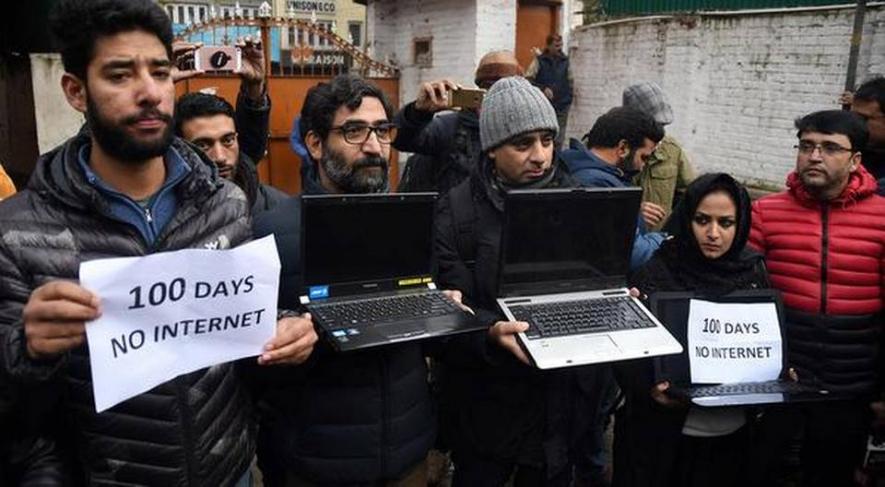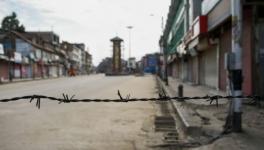Unreliable Internet Spurs Over 80% Drop in Smartphone Sales in Kashmir

Image Courtesy: The Hindu
Srinagar: In any other part of the world, people await the latest smartphone market to keep themselves up-to-date with rapidly changing technology. Not in Kashmir, where the trend seems to be reversing due to the continued restriction on high-speed internet.
The smartphone industry is bearing the brunt of prolonged internet restriction since August 5 when the Centre revoked the statehood of Jammu and Kashmir and downgraded it into two Union territories, while also snapping all lines of communication. Estimates suggest that there has been more than an 80% decline in the smartphone sales graph across Kashmir.
Experts associated with the smartphone business told NewsClick that Kashmir is a market for about 40,000 mobile phones and the number has now come down to not more than 5,000. Although J&K ordered resumption of 2G-services across all networks, on January 24, access to limited websites and slow speed has failed to help people.
Owners of mobile phone stores say that there is low demand and that they are not able to remain updated about newly launched models. “Our information is solely based on the internet. We do not know what’s new, neither do consumers. Nobody comes in looking for an upgrade to their existing phone. Only those who have either lost or had their mobile phones damaged are coming to us,” says Waseem Ahmad, a mobile store owner.
Stakeholders in the industry, whose businesses are close to becoming unsustainable at the moment in the absence of the internet, ask that if restoring mobile internet is an issue, what stops the administration from resuming broadband services?
“Sales are down by around 80% in Kashmir, thus bringing the business to a grinding halt. Those associated with the trade are hardly being able to push the business any forward,” says Amir Bhat, who is associated with the industry in Srinagar.
Customers, on the other side, are also not satisfied with the unavailability of products at the mobile stores in Kashmir. They rarely find what they are looking for. “I came here to buy a particular product, but they did not have it. They are even unable to provide the specifications to me because of no availability of the internet,” says Ali Asghar, a customer looking for an upgrade of his mobile device, who added that without high-speed internet, a smartphone was of no use.
Following the suspension of internet, seven million people in the Valley were pushed back to the ‘dark ages’. They were unable to sustain online businesses and access information. As the suspension of internet dragged on, they began disappearing from social media platforms, like WhatsApp, because their accounts were automatically deleted after 120 days of inactivity.
The internet suspension in J&K has been termed the longest in a democracy by Access Now, an advocacy group that tracks internet freedom. It has landed a severe blow on the economy of the erstwhile state with the Kashmir chamber of commerce estimating a loss of $1.4 billion.
Aside from the dip in sales, another aspect of the smartphone industry in Kashmir is that a large number of youths working as sales executives also lost their jobs post-August 5.
One such employee, Suhail told NewsClick that on December 14, 2019, he received a call from his company that his contract could not be extended. “This was the first time I received such a call from my company. I am still looking for a new job. I have applied at two different palaces,” he says. He adds that he has been in the smartphone industry for the last eight years and called this its “worst phase”, saying that after August 5 “I have done business worth Rs 6-7 lakh which is nothing, as we used to do business worth Rs 50,000-80,000 per day,” he said.
Riyaz Ahmad, another mobile store owner, explained this trend: “The availability of manpower is directly related to profitability. Profitability has nosedived, and as a result, so has employability. It is the reason why so many sales executives have lost their jobs,” he says.
He says that the industry is solely dependent on the internet and in its absence, the sales graph has gone all the way down, with few hopes of revival if the internet gag continues.
He said that the administration should review its decision of banning internet services as the measure has made a huge dent in businesses in general and in smartphone business in particular. “The ground situation is deplorable which the administration should now look into,” he says.
The writer is an independent journalist based in Kashmir.
Get the latest reports & analysis with people's perspective on Protests, movements & deep analytical videos, discussions of the current affairs in your Telegram app. Subscribe to NewsClick's Telegram channel & get Real-Time updates on stories, as they get published on our website.























